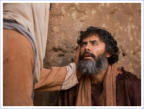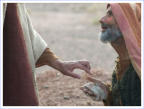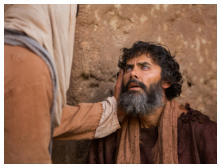
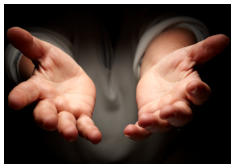
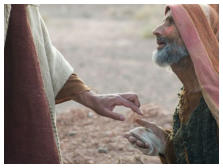
“And
when
He
had
come
down
from
the
mountain,
great
multitudes
followed
Him.
And
behold,
a
leper
came
to
Him,
and
bowed
down
to
Him,
saying,
‘Lord,
if
You
are
willing,
You
can
make
me
clean.’
And
He
stretched
out
His
hand
and
touched
him,
saying,
‘I
am
willing;
be
cleansed.’
And
immediately
his
leprosy
was
cleansed.
And
Jesus
said
to
him,
‘See
that
you
tell
no
one;
but
go,
show
yourself
to
the
priest,
and
present
the
offering
that
Moses
commanded,
for
a
testimony
to
them.’
…
And
as
they
were
going
out
from
Jericho,
a
great
multitude
followed
Him.
And
behold,
two
blind
men
sitting
by
the
road,
hearing
that
Jesus
was
passing
by,
cried
out,
saying,
‘Lord,
have
mercy
on
us,
Son
of
David!’
And
the
multitude
sternly
told
them
to
be
quiet;
but
they
cried
out
all
the
more,
saying,
‘Lord,
have
mercy
on
us,
Son
of
David!’
And
Jesus
stopped
and
called
them,
and
said,
‘What
do
you
want
Me
to
do
for
you?’
They
said
to
Him,
‘Lord,
we
want
our
eyes
to
be
opened.’
And
moved
with
compassion,
Jesus
touched
their
eyes;
and immediately they regained their sight and followed Him” (Matthew 8:1-4; 20:29-34).
The Pursuit of Jesus
Two
curious
references
in
two
stories
of
Jesus’
healing
miracles
might
provide
a
window
into
the
desperation
required
to
seek
Him
successfully.
In
the
first,
a
leper
approaches
Jesus
and
expresses
supreme
confidence
in
His
ability
to
heal
him.
When
Jesus
touches
the
leper,
he
is
immediately
healed.
Yet,
that
Jesus
tells
him
not
to
tell
anyone
seems
odd,
especially
since
great
multitudes
were
following
Him.
How
did
this
leper,
whom
law
relegated
to
the
fringes
of
society,
manage
to
get
so
close
to
Jesus?
A
variety
of
explanations
is
imaginable,
but
Mark
(1:35-45)
provides
a
plausible
one.
There,
this
account
is
bracketed
at
the
end
by
the
observation
that
the
multitudes
so
crowded
Jesus
that
He
had
to
remain
in
unpopulated
areas
(vs.
45)
and
at
the
beginning
by
the
fact
that
Jesus’
popularity
also
required
Him
to
rise
early
to
seek
privacy
for
prayer
(vss.
35-37;
cf.
Lk.
5:16).
It
is
possible,
then,
that
the
leper
followed
Jesus
and
the
crowds
at
a
distance,
awaiting
an
opportunity
to
approach
Jesus
when
He
was
alone.
If
so,
he
might
have
followed
Jesus
for
days,
watching
Him
and
learning
His
habits.
As
a
result,
He
would
have
discovered
that
Jesus’
practice
was
to
rise
early,
before
anyone
else
awakened,
to
seek
isolation
for
prayer.
In
such
a
scenario,
the
leper
might
have
noted
the
house
in
which
Jesus
retired
and
kept
a
lonely
vigil
through
the
night,
watching
the
door
from
which
Jesus
would
emerge.
Then,
he
would
follow,
and
approach,
Him
in
his
desperate
quest
to be cleansed of his leprosy.
Another
curious
element
lies
in
the
story
of
Jesus’
healing
of
two
blind
men.
Matthew
says
that
this
incident
occurred
as
Jesus
was
exiting
Jericho,
but
Luke
says
it
occurred
as
He
was
entering
(Lk.
18:35ff).
It
is
possible
that
the
writers
condensed
their
accounts,
so
that
one
relates
how
it
began
and
the
other
how
it
ended.
Under
this
scenario,
the
blind
men
would
have
enquired
as
to
Jesus’
identity
as
He
was
entering
Jericho.
Perhaps
their
cry
failed
to
get
Jesus’
attention
before
He
disappeared
into
the
city.
Yet,
the
blind
men
did
not
give
up
but,
confident
in
their
faith
that
Jesus
could
heal
them
and
desperate
to
be
relieved
of
their
blindness,
would
have
known
the
gate
Jesus
would
have
to
exit
Jericho
to
continue
on
His
way
to
Jerusalem
and
would
have
made
their
way
to
it
to
await
Him
and
make
another,
more
vigorous
effort.
If
so,
the
faith
which
moved
them
to
renew
their
efforts,
blessed
them
with
success.
This
scenario
not
only
relieves
an
apparent
conflict
but
also
makes
a
more
vivid
picture
of
the
measures
to
which
resolute
faith
will
drive
individuals
who
desperately
desire
to
be relieved of their blindness.
While
it
cannot
be
known
whether
these
possibilities
are
what
actually
happened,
it
is
certain
that
any
who
would
be
healed
of
spiritual
sickness
and
blindness
must
seek
Jesus
with
the same kind of desperate and determined faith which granted success to these men.
Click on this image for slide show.

















“And
when
He
had
come
down
from
the
mountain,
great
multitudes
followed
Him.
And
behold,
a
leper
came
to
Him,
and
bowed
down
to
Him,
saying,
‘Lord,
if
You
are
willing,
You
can
make
me
clean.’
And
He
stretched
out
His
hand
and
touched
him,
saying,
‘I
am
willing;
be
cleansed.’
And
immediately
his
leprosy
was
cleansed.
And
Jesus
said
to
him,
‘See
that
you
tell
no
one;
but
go,
show
yourself
to
the
priest,
and
present
the
offering
that
Moses
commanded,
for
a
testimony
to
them.’
…
And
as
they
were
going
out
from
Jericho,
a
great
multitude
followed
Him.
And
behold,
two
blind
men
sitting
by
the
road,
hearing
that
Jesus
was
passing
by,
cried
out,
saying,
‘Lord,
have
mercy
on
us,
Son
of
David!’
And
the
multitude
sternly
told
them
to
be
quiet;
but
they
cried
out
all
the
more,
saying,
‘Lord,
have
mercy
on
us,
Son
of
David!’
And
Jesus
stopped
and
called
them,
and
said,
‘What
do
you
want
Me
to
do
for
you?’
They
said
to
Him,
‘Lord,
we
want
our
eyes
to
be
opened.’
And
moved
with
compassion,
Jesus
touched
their
eyes;
and
immediately
they
regained their sight and followed Him” (Matthew 8:1-4; 20:29-34).
The Pursuit of Jesus
Two
curious
references
in
two
stories
of
Jesus’
healing
miracles
might
provide
a
window
into
the
desperation
required
to
seek
Him
successfully.
In
the
first,
a
leper
approaches
Jesus
and
expresses
supreme
confidence
in
His
ability
to
heal
him.
When
Jesus
touches
the
leper,
he
is
immediately
healed.
Yet,
that
Jesus
tells
him
not
to
tell
anyone
seems
odd,
especially
since
great
multitudes
were
following
Him.
How
did
this
leper,
whom
law
relegated
to
the
fringes
of
society,
manage
to
get
so
close
to
Jesus?
A
variety
of
explanations
is
imaginable,
but
Mark
(1:35-45)
provides
a
plausible
one.
There,
this
account
is
bracketed
at
the
end
by
the
observation
that
the
multitudes
so
crowded
Jesus
that
He
had
to
remain
in
unpopulated
areas
(vs.
45)
and
at
the
beginning
by
the
fact
that
Jesus’
popularity
also
required
Him
to
rise
early
to
seek
privacy
for
prayer
(vss.
35-37;
cf.
Lk.
5:16).
It
is
possible,
then,
that
the
leper
followed
Jesus
and
the
crowds
at
a
distance,
awaiting
an
opportunity
to
approach
Jesus
when
He
was
alone.
If
so,
he
might
have
followed
Jesus
for
days,
watching
Him
and
learning
His
habits.
As
a
result,
He
would
have
discovered
that
Jesus’
practice
was
to
rise
early,
before
anyone
else
awakened,
to
seek
isolation
for
prayer.
In
such
a
scenario,
the
leper
might
have
noted
the
house
in
which
Jesus
retired
and
kept
a
lonely
vigil
through
the
night,
watching
the
door
from
which
Jesus
would
emerge.
Then,
he
would
follow,
and
approach,
Him in his desperate quest to be cleansed of his leprosy.
Another
curious
element
lies
in
the
story
of
Jesus’
healing
of
two
blind
men.
Matthew
says
that
this
incident
occurred
as
Jesus
was
exiting
Jericho,
but
Luke
says
it
occurred
as
He
was
entering
(Lk.
18:35ff).
It
is
possible
that
the
writers
condensed
their
accounts,
so
that
one
relates
how
it
began
and
the
other
how
it
ended.
Under
this
scenario,
the
blind
men
would
have
enquired
as
to
Jesus’
identity
as
He
was
entering
Jericho.
Perhaps
their
cry
failed
to
get
Jesus’
attention
before
He
disappeared
into
the
city.
Yet,
the
blind
men
did
not
give
up
but,
confident
in
their
faith
that
Jesus
could
heal
them
and
desperate
to
be
relieved
of
their
blindness,
would
have
known
the
gate
Jesus
would
have
to
exit
Jericho
to
continue
on
His
way
to
Jerusalem
and
would
have
made
their
way
to
it
to
await
Him
and
make
another,
more
vigorous
effort.
If
so,
the
faith
which
moved
them
to
renew
their
efforts,
blessed
them
with
success.
This
scenario
not
only
relieves
an
apparent
conflict
but
also
makes
a
more
vivid
picture
of
the
measures
to
which
resolute
faith
will
drive
individuals
who desperately desire to be relieved of their blindness.
While
it
cannot
be
known
whether
these
possibilities
are
what
actually
happened,
it
is
certain
that
any
who
would
be
healed
of
spiritual
sickness
and
blindness
must
seek
Jesus
with
the
same
kind
of
desperate
and
determined
faith
which
granted
success
to
these
men.
Click on this image for slide show.
